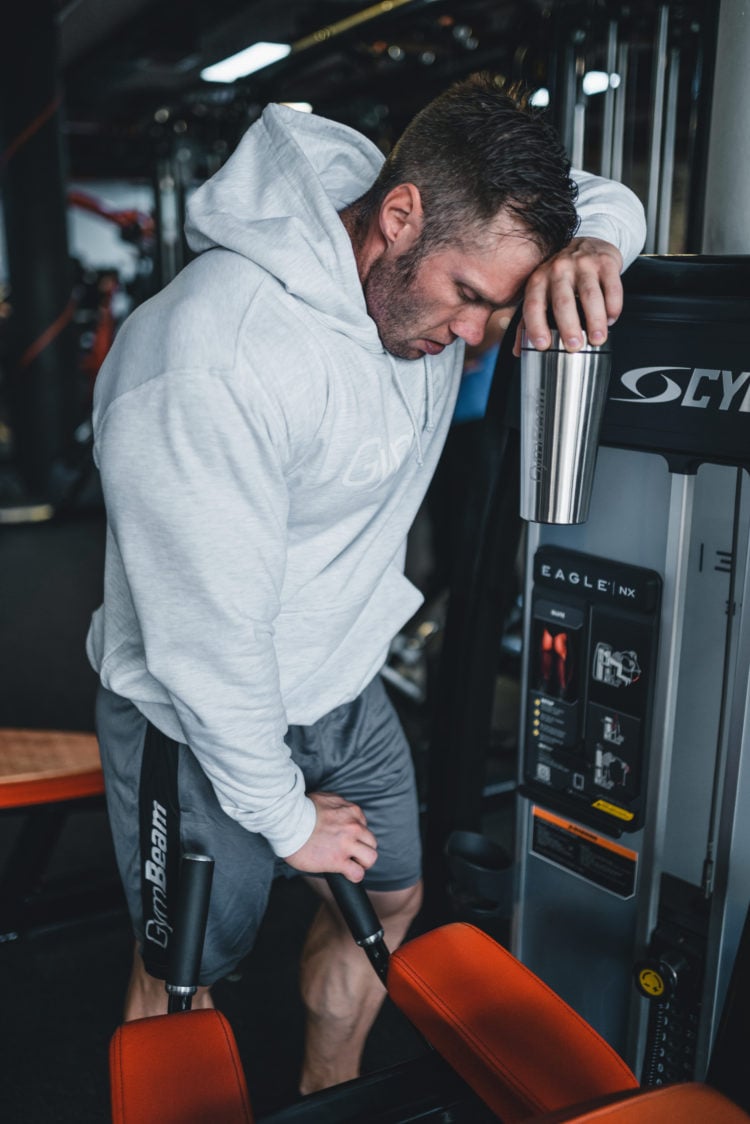Table of Contents
Caffeine is probably the most widely used stimulant worldwide. In the form of freshly brewed coffee, tea or through dietary supplements, we take it in the morning, during the day and many of us like it before a workout. Not only can it give a good boost beforehand, but it also has a number of other benefits, such as supporting sporting performance and helping with weight loss. But you must remember that caffeine is a good servant, but also a bad master. There are some risks associated with it that can negatively affect your performance and health. That is why it is important to monitor your caffeine intake and to know how to use it properly.
Where can you find caffeine?
The most well-known natural source of caffeine is undoubtedly the coffee bean, which is used to make espresso, filter and other coffee drinks. Tea leaves, especially green tea, matcha or Yerba maté, also contain this stimulant. However, caffeine in its natural form is also found in cocoa beans. If you need a change, try swapping your coffee for a cup of cocoa or a small square of good quality dark chocolate. But expect to take in less caffeine than you would from coffee. [1]
It is also worth mentioning guarana or kola nut, which can be found in the original recipe for the world-famous Coca-Cola. However, the latter still contains caffeine today, and there are many others in the wide range of lemonades that have caffeine in their ingredients. It is also added to nutritional supplements, typically taken before and during sporting activity. These include, for example, pre-workout supplements or energy drinks, shots or gels. [1]
Are you a green tea lover? Then you should not miss our article 8 Positive Benefits of Green Tea on the Health of Athletes.

What effects does caffeine have on the body?
1. Reduces fatigue and replenishes energy
Many of us can’t imagine going to workout without drinking a fresh espresso. People think of it as a ritual to boost up and get in the right mood. But what’s the real reason behind caffeine’s invigorating effect? Its main mechanism of action is its unique ability to bind to adenosine receptors. By blocking them, it can reduce the action of adenosine, which is designed to calm you down, make you feel relaxed, sleepy and tired. Instead, caffeine makes you more alert and can make you feel a burst of energy, which is exactly what you need at that moment. That’s why caffeine has its place of honour in pre-workout supplements formulas. [2]
2. Good mood and contentment
Drinking coffee is also associated with a feeling of contentment and good mood. This effect, in turn, is probably related to caffeine’s potential ability to increase the amount of receptors for certain neurotransmitters such as dopamine, serotonin or GABA (gamma-aminobutyric acid). It is these substances that affect your mental state and can produce almost euphoric feelings. Over time, you may even work your way up to feeling the urge or need to have coffee at certain times of the day. If you don’t get it, you may experience headaches, irritability and other unwanted symptoms. This is because the body has already formed a habit and craves the pleasurable effects of caffeine. The more caffeine you ingest, the more intense the symptoms may be after you omit it. [2-4]
3. Greater alertness
The level of the hormones adrenaline and cortisol can also rise in the body after having caffeine. This is recognised by increased alertness, faster heart rate and better blood flow to the muscles. It will also cause a momentary increase in blood pressure and heart rate. All of these effects can have their positives as well as negatives in terms of athletic performance. [3]
To learn more about the effects of coffee, read our article Is Coffee Healthy? 7 Reasons Why You Should Give It a Go.
You might be interested in these products:
5 benefits of caffeine intake before a workout
Caffeine has its permanent place in the pre-workout routine of many athletes. Proof of this is, for example, a study that found that 3 out of 4 elite athletes indulge in caffeine before or during training. This is also the case of recreational athletes, who go and exercise after work, it’s probably not much less. Caffeine in its various forms is popular with endurance and strength athletes, as well as footballers and other team athletes. [5]
An interesting fact is that caffeine was on the list of banned substances of international sports organisations between 1984 and 2004. If the sample (urine) of an athlete had a concentration higher than 12 μg/ml of caffeine, it was considered doping. This roughly corresponds to an intake of 10 mg of caffeine per 1 kg of body weight, which is well above the normally recommended values. At present, athletes are no longer tested for caffeine, but the World Anti-Doping Agency (WADA) continues to monitor caffeine intake and advises athletes to keep below 12 µg/ml in case the topic comes up again in the future. [6]

1. Provides an energy boost before a workout
Almost everyone needs a little or a lot of support before exercising. It often happens that before a planned sporting activity you feel somewhat devoid of energy. You automatically reach for caffeine in the form of coffee, energy drink or pre-workout and wait for the familiar stimulating effect. This can occur within minutes and is strongest between the 30th and 120th minute after taking caffeine. At that time, you may feel more alert, motivated, focused and more prepared for the upcoming sporting exertion. [6]
Sufficient and good quality sleep is also crucial for high sporting performance. Read more about this in our article Sleep: The Most Effective Energy Booster and Fat Burner.
2. Better sporting performance
In terms of promoting athletic performance, caffeine is one of the most researched substances worldwide. It is most commonly associated with improved endurance performance, but a number of studies have confirmed its positive effects on strength, coordination and other sporting skills. In addition, it can also improve brain functions such as alertness, attention and reaction time. It is thus a versatile tool that can help a sprinter run faster, a basketball player shoot the basket more accurately or a football player read the game more carefully and stay one step ahead of the opponent. [5-7]
- The positive effect of caffeine on sports performance is mainly due to the aforementioned effect on reducing fatigue or increasing adrenaline levels, which can often bring out literally supernatural performances.
- It can also contribute to improved blood circulation in the muscles, greater resistance to exertion and perceived pain.
- It may also play a role in promoting the breakdown of fat into energy, which can be better utilised during exercise. [2]
Improvements of as little as one percent have been observed in studies. On average, endurance improved by 2 – 4% and strength by 2 – 7% in athletes after caffeine intake. This may seem like a small number, but in the case of athletes, success and failure are often decided by milliseconds, which can bring them closer to winning a medal. [6]
To learn more about the effects of caffeine on athletic performance, read our article Caffeine and How It Can Enhance Your Training Performance.
3. Supports fat burning and weight loss
Caffeine can kick-start more than just your minds or muscles. It even has the ability to speed up metabolism. Thanks to this, its intake before a workout can lead to more calories burned, which will be especially appreciated when losing weight. Thanks to its effects, it belongs among the thermogenic fat burners.
- First of all, it can encourage an individual to exercise with more focus, more integrity, more passion and at a higher intensity, which can result in more energy burned.
- Studies have shown that caffeine affects the catecholamine hormones (adrenaline and noradrenaline), which can speed up the metabolism.
- Caffeine can also increase oxygen uptake during exercise, which can also increase calorie consumption during exercise.
- This substance also has the ability to increase the breakdown of fat (lipolysis) into energy, which is then used for physical movement. For this reason, the burning effect of caffeine works best in conjunction with exercise.
- Experts also believe that it plays a role in increasing the concentration of cyclic adenosine monophosphate (cAMP), which can activate the enzyme lipase that breaks down fat and helps to convert it into usable energy. [2, 8-9]
In case you want to try a fat burner and don’t know how to choose one, read our article How to Choose and Take the Most Effective Fat Burner?

4. Reduces fatigue and muscle pain
Runners and other endurance athletes, who often spend the most time doing sports, struggle with fatigue during training. They can easily deplete their energy stores in the form of glycogen, which results in a decline in performance. The intake of simple carbohydrates during exercise in the form of gels or ion supply drinks helps to prevent this. However, caffeine may also contribute. This is because during physical activity it helps to break down stored fats into a usable energy source, which can then lead to glycogen sparing. Caffeine during sport also helps to reduce fatigue and increase your energy levels subjectively by reducing adenosine activity and affecting the nervous system (CNS).
In addition, it has also been shown to reduce muscle soreness during exercise. This is probably due to its ability to suppress the effects of adenosine, which has an effect on pain signalling. This allows an individual to handle a slightly heavier load or to maintain the intensity of the exercise for as long as possible. [5, 10]
If you are involved in endurance sports and are looking for ways to effectively replenish your energy and fluids during a long performance, read our article Sports Drinks: When to Drink an Ion Supply Drink or Water?
5. Easier to handle demanding or lengthy workouts
When we put all the effects of caffeine together, we get the key that can help unlock the next level of athletic potential. From the very first boost, through to reducing fatigue and pain, you can work your way up to tackling slightly more challenging or longer workouts. It’s also possible that you’ll find exercise a little easier than if you hadn’t had caffeine before your workout.

5 disadvantages of consuming caffeine before a workout
After reading all the positive effects, it may seem that caffeine before a workout will bring only positive benefits. Unfortunately, even caffeine has its risks, and it is not always suitable before working out. What can happen if you exceed the maximum daily recommended dose, have a higher sensitivity to caffeine or take it at an inappropriate time?
1. Risk of sleep disturbances
Caffeine generally has a rapid onset of action and its effects can be felt in just a few minutes. But then it stays in the body for quite a long time. It can take as long as 9.5 hours before it is completely eliminated. For most people it takes 4 – 6 hours. So even six hours after drinking coffee, you may have trouble relaxing your body, calming your mind and tuning in to sleep. Even if you do manage to fall asleep, you may still wake up during the night and probably won’t get the recommended 7 – 9 hours of sleep. Caffeine can also reduce the amount of deep sleep that is essential for quality rest. For this reason, it is commonly recommended to avoid caffeine for six hours before going to bed. [11-12]
If you ever have trouble sleeping and are wondering how to improve it, read our article How to Fall Asleep Quickly? Try These Simple Tips for a Better Sleep.
What effect does DNA have on the breakdown of caffeine?
This general recommendation may not apply to everyone. You may have just thought of someone who still has coffee after dinner and sleeps like a baby. On the other hand, there are many people who can only have coffee or strong green tea in the morning because they otherwise have trouble falling asleep. The explanation for this phenomenon can be found in DNA. The enzyme responsible for the metabolism of caffeine is encoded by the CYP1A2 gene. Depending on which variant of this gene you have, you can then classify yourself as either slow or fast metaboliser of caffeine. [13]
Home DNA tests can also help reveal your genetic potential for caffeine metabolism. To learn more about them, read our article Everything You Need to Know About Home DNA Tests.

2. Digestive disorders
If you have a more sensitive stomach or overdo it with caffeine, you may end up spending most of the workout in the toilet instead of lifting weights. This is because caffeine increases the production of stomach acid (hydrochloric acid), which can cause stomach irritation or reflux (stomach juices returning to the oesophagus) in large quantities.
In addition, it also promotes bowel function, which is not exactly suitable for when working out. If you don’t drink much coffee and want to start supplementing caffeine, it is better to start with a smaller dose and monitor your body’s reaction. [3, 14]
3. Increased nervousness, irritability and other side effects
Caffeine triggers a whole host of reactions in the body that make you feel more motivated and energised. But too much of anything is bad for you. When you cross the threshold for a safe caffeine intake, or become more sensitive to it, you may notice that you feel jittery, anxious, irritable, shaky or have heart palpitations.
In most cases, it’s nothing serious, and these symptoms should go away as the caffeine is eliminated from your system, but you certainly don’t want to feel this way during a workout or at any time of the day. To avoid this, you need to follow the recommended dosage and your individual caffeine tolerance. [15]
4. Increased tolerance to caffeine
If you are a regular consumer of caffeine in any form, it may happen over time that the same dose doesn’t get you as hyped up as it used to. Our body can build up a tolerance to caffeine. To achieve the same effects, you may need to increase your daily intake, which may bring adverse effects. In this case, you can try cycling caffeine.
How does caffeine cycling work?
Remove all sources of caffeine from your diet and supplementation plan for 2 – 8 weeks. When doing this, it is important to prepare for the possibility of withdrawal symptoms during the first few days. This is especially common in people who have been consuming higher doses of caffeine. These symptoms typically include irritability and sometimes headaches. However, if you can get through the first few days and endure a cycle of caffeine withdrawal, you can then enjoy the greater effects of caffeine again. Thus, a smaller dose will simply be enough to achieve the targeted effect. [16-17]
5. Risk of excessive intake or overdose
Ingesting more caffeine than is healthy during the day is easier than it may seem. Just have two cups of strong espresso, drink a litre of sugar-free cola and one energy drink before your workout and you’re over the top. If you really overdo it with our caffeine intake during the day, you may even experience digestive problems, heart palpitations and sleep problems, which will result in another need for a caffeine boost, leading into a vicious cycle. For this reason, you should keep an eye on your daily intake of caffeine.
How much caffeine does your favourite drink contain?
The table below shows the average caffeine levels in drinks. The caffeine content of specific beverages may vary depending on the type of beans used, the method of preparation, the amount of coffee used or the length of the infusion. The same applies to tea. A typical measure for most beverages is one cup. [19]
Beverage | Amount of caffeine per serving |
|---|---|
| Hot chocolate | 5 mg |
| Decaf coffee | 6 mg |
| Green tea | 25 mg |
| Coca-Cola (1 can – 330 ml) | 34 mg |
| Black tea | 42 mg |
| Instant coffee | 57 mg |
| Red Bull (1 can – 250 ml) | 76 mg |
| Espresso | 77 mg |
| Filtered coffee | 163 mg |
Recommended amounts of caffeine
- EFSA (European Food Safety Authority) has set the upper limit of caffeine intake at 400 mg per day for a 70 kg person, which corresponds to an intake of 5.7 mg/kg per day.
- One serving should contain no more than 200 mg of caffeine (3 mg/kg). [18]
- According to the ISSN (International Society of Sports Nutrition), a level of 3 – 6 mg/kg of caffeine per day is appropriate to support sports performance.
- A very high caffeine intake, such as 9 mg/kg, is associated with a high incidence of side effects and is unlikely to have a positive effect on performance. More is not better in this case.
- Caffeine is recommended to be taken 30-60 minutes before a workout. [6]
Daily amounts of caffeine by weight
Body weight | Caffeine dose 3 – 6 mg/kg per day |
|---|---|
| 50 kg | 150 – 300 mg |
| 60 kg | 180 – 360 mg |
| 70 kg | 210 – 420 mg |
| 80 kg | 240 – 480 mg |
| 90 kg | 270 – 540 mg |
| 100 kg | 300 – 600 mg |
Which sources of caffeine are the best?
- For example, you can enjoy a fresh espresso or filtered coffee before your workout. Do not add milk or sugar, as this way the caffeine is absorbed faster and you avoid extra calories.
- Another option is BCAA drinks, which often contain vitamins and minerals in addition to caffeine and amino acids.
- Caffeine tablets are also suitable as they contain an effective amount of 200 mg of caffeine per serving.
- You can also use caffeinated pre-workout supplements, energy shots, capsules or extracts from green tea or guarana.
- The advantage of dietary supplements with caffeine is that you can tell how much of the active substance you have taken. Unfortunately, this is not possible with coffee or tea, where a large number of factors influence the caffeine content.
What should you remember?
Adding caffeine to pre-workout supplementation can provide a number of benefits. This substance will energize, prepare for physical activity and boost your performance during a workout. You will be able to exercise longer and push through more intense workouts with greater ease. However, caffeine also has its other, darker side. One can easily exceed its recommended daily intake, which in more sensitive individuals can cause digestive or sleep problems. That’s why it’s important to stick to this recommendation while listening to your own body’s reactions. This is the only way to get the best out of caffeine.
If you found the article useful and learned something new, share it with your friends so they can also learn about the benefits and risks of taking caffeine before a workout.
[1] Reyes, C. M., & Cornelis, M. C. Caffeine in the Diet: Country-Level Consumption and Guidelines. [ https://doi.org/10.3390/nu10111772
[2] Frank, K., Patel, K., Lopez, G., & Willis, B. Caffeine Research Analysis. – https://examine.com/supplements/caffeine/
[3] Precision Nutrition. Coffee and hormones: Here’s how coffee really affects your health. – https://www.precisionnutrition.com/coffee-and-hormones
[4] Energy, V. Caffeine cycling for chronic users brings back that caffeine kick. – https://www.goviter.com/blogs/viter-energy-blog/caffeine-cycling
[5] Martins, G. L., Guilherme, J. P. L. F., Ferreira, L. H. B., de Souza-Junior, T. P., & Lancha, A. H. Caffeine and Exercise Performance: Possible Directions for Definitive Findings. – https://www.frontiersin.org/articles/10.3389/fspor.2020.574854
[6] Guest, N. S., VanDusseldorp, T. A., Nelson, M. T., Grgic, J., Schoenfeld, B. J., Jenkins, N. D. M., Arent, S. M., Antonio, J., Stout, J. R., Trexler, E. T., Smith-Ryan, A. E., Goldstein, E. R., Kalman, D. S., & Campbell, B. International society of sports nutrition position stand: Caffeine and exercise performance. – https://doi.org/10.1186/s12970-020-00383-4
[7] McLellan, T. M., Caldwell, J. A., & Lieberman, H. R. A review of caffeine’s effects on cognitive, physical and occupational performance. – https://doi.org/10.1016/j.neubiorev.2016.09.001
[8] Acheson, K. J., Gremaud, G., Meirim, I., Montigon, F., Krebs, Y., Fay, L. B., Gay, L.-J., Schneiter, P., Schindler, C., & Tappy, L. Metabolic effects of caffeine in humans: Lipid oxidation or futile cycling? – https://doi.org/10.1093/ajcn/79.1.40
[9] Tabrizi, R., Saneei, P., Lankarani, K. B., Akbari, M., Kolahdooz, F., Esmaillzadeh, A., Nadi-Ravandi, S., Mazoochi, M., & Asemi, Z. The effects of caffeine intake on weight loss: A systematic review and dos-response meta-analysis of randomized controlled trials. – https://doi.org/10.1080/10408398.2018.1507996
[10] Baratloo, A., Rouhipour, A., Forouzanfar, M. M., Safari, S., Amiri, M., & Negida, A. The Role of Caffeine in Pain Management: A Brief Literature Review. – https://doi.org/10.5812/aapm.33193
[11] National Academies Press (US). Pharmacology of Caffeine– https://www.ncbi.nlm.nih.gov/books/NBK223808/
[12] Sleep Foundation. Caffeine’s Connection to Sleep Problems. – https://www.sleepfoundation.org/nutrition/caffeine-and-sleep
[13] Science. Do you love or loathe coffee? Your genes may be to blame. – https://www.nationalgeographic.com/science/article/news-daylight-saving-time-coffee-caffeine-genes-dna
[14] Energy Drinks, Caffeine and Your Digestion. – https://healthblog.uofmhealth.org/wellness-prevention/energy-drinks-caffeine-and-your-digestion
[15] National Library of Medicine. Caffeine. Získáno – https://medlineplus.gov/caffeine.html
[16] Lab, P. Caffeine Cycling: Good Idea or Not Worth It? – https://www.performancelab.com/blogs/stim/caffeine-cycling
[17] Examine.Com. Do I need to cycle caffeine? – https://examine.com/nutrition/do-i-need-to-cycle-caffeine/
[18] EFSA. Caffeine.– https://www.efsa.europa.eu/en/topics/topic/caffeine
[19] Examine.Com. How much caffeine is too much? – https://examine.com/nutrition/caffeine-consumption/


Add a comment